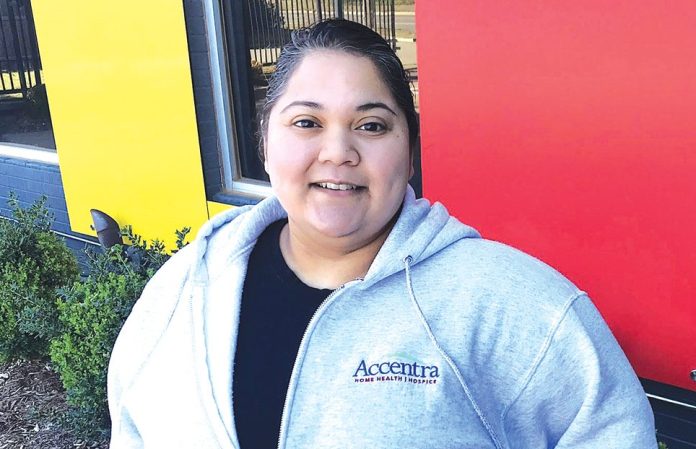by James Coburn, Staff Writer
When Blanca Rubio answers patients’ phone calls at Accentra Home Health & Hospice in Edmond, her patients immediately recognize her voice.
“They say, ‘Oh, it’s Blanca,’” said Rubio, LPN. “We’ve got a good relationship.”
As with many home health nurses, Rubio loves that the nursing staff has ample time to know their patients well. Rubio brings a cheerful smile to conversation.
She serves as a triage nurse available at all hours and helps in the field. She gets to provide intravenous therapies, wound care, injections and lab work.
“We get to do so many skills,” she said. (STORY CONTINUES BELOW)
She began her career journey at the same home health and hospice location in 2009 as a home health aide. Rubio volunteered in nursing homes at age 15 when she was a student at Del City High School doing their vo-tech program. It was then when she achieved her CNA license by age 17.
She continued her home health aide work while studying to become an LPN 11 years ago, and graduated from the Moore Norman Technology Center, located in Norman.
“Once I got into home health, I wanted to stay in it,” Rubio said. “I love the nurses and everyone that’s been here. I love the patients and the owners. We’ve transitioned a few times with different owners. We have a lot of longevity of people working for a long time. They’re like my family.”
She said the past couple of years has been difficult with the loss of several patients’ lives because of COVID. Family members call when they need help.
One of her long-term patients was apologetic when calling Rubio recently at 2 a.m. She was grateful that Rubio responded with home health services.
“We try not to go out in the middle of the night but if it’s an emergency we need to be there,” she continued. “I’m always on call, too, and usually available. I tell patients all the time to just call me.”
Rubio said she is also her family’s nurse, too. She has a son. When Rubio arrived at a woman’s home recently, her patient had prepared a bag full of snacks and a drink for him.
“It was sweet of her to ask about my son,” she said. “You really get to know one another. You’ve got to keep them out of the hospital.”
Home health patients do not drive, so they enjoy their weekly visits of 30 minutes to an hour of care and conversation with a member of the nursing staff.
“I’ve spent two hours before with a patient. Especially with COVID, family members weren’t able to visit,” Rubio said.
Her time is used wisely while providing a lot of education. Rubio said physicians may give their patients written educational material. Rubio mentioned that she often hears patients mentioning that their doctor never told them about something.
“That’s what we’re there for — the educational part — to make sure they’re understanding, following up and continuing their education,” Rubio said.
Some people don’t know about when to ask about home health. With any new diagnosis, it can be difficult to understand and incorporate a new medication. People often take more than one and can forget whether they took a pill.
“It’s really great to have a nurse there to teach you how to take the medication, teach you about your new diagnosis, heart failure. Heart failure is scary,” she said.
Patients coping with heart failure might not understand the problematic symptoms of disease to look for. At times they don’t want to call their physician’s office when thinking their doctor is busy.
“That’s what home health is for,” Rubio said. “We’re able to educate on those things, not only for the patients but their family members. They also need to understand what to look for and when to call, because our hospitals are full right now.”
Rubio has responded to patients in their 20s or 30s. Often, a younger patient will have cancer. So, Rubio reinforces the family members’ educational needs about caring for their loved one.
Diabetes management is another reason families inquire about home health. Accentra offers a lot of diet and nutritional education.
“Carbs are a big thing. A lot of people do not realize how much sugar is in their foods,” she said. “We make sure they know how to read the nutritional labels and what to look for when they make those choices.”
It’s easy to grab convenient foods. But too much sugar impacts the body’s long-term health. Diabetes may lead to kidney failure which changes the structure of the heart. Diabetes can deteriorate a person’s vision, too.
“So education is a big thing,” she said.
Rubio’s altruistic spirit doesn’t stop there. She has even taken in two dogs and helped them find new homes when a patient has passed away. She also likes to paint nature scenes and give them to her patients. And, she is helping her sister-in-law who recently formed the nonprofit Legacy for Love Foundation, a group to feed the homeless population of Oklahoma City.
“We did our first fundraiser and were able to feed 100 of the homeless. Just with home health I’ve seen how many people need help, so this is another way of giving,” she said. “I think we’re going to try to give them blankets next month.”
To learn more about Legacy of Love Foundation, please do a search on Facebook or visit
https://www.facebook.com/LegacyofloveOK/about.













